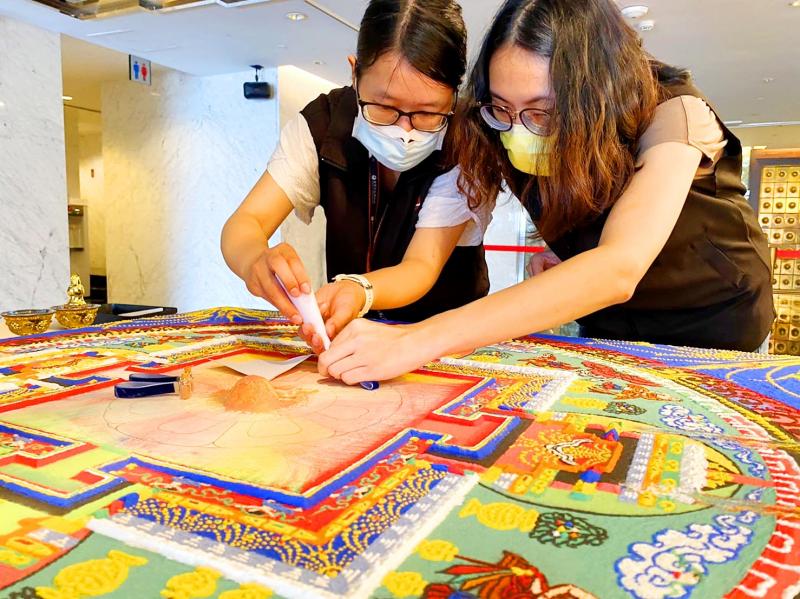A Tibetan monk built a sand mandala in a prayer for peace and an end to the COVID-19 pandemic as the Museum of World Religions in New Taipei City reopened on Wednesday.
A sand mandala is a form of Tibetan religious art using ground minerals to form geometric patterns and holy symbols, the museum said in a news release.
Prayers to buddhas and bodhisattvas are given, and scriptures are chanted before creating a sand mandala, a reverent meditation on life and impermanence, it said.

Photo courtesy of the Museum of World Religions
Mandala are incredibly difficult to construct, said Cho Ching-mei (卓靜美), the museum’s director of exhibitions and collections.
They are easily damaged, embodying transience, Cho said.
The art form is an appropriate reflection of the state of the world and Taiwan as it eases COVID-19 restrictions, she said.
The mandala was created by Taiwan-based Tibetan monk I Hsi Sang-chu (義喜桑珠) in the sixth-floor hall of the museum in Yonghe District (永和), Cho said.
Following the mandala’s ritual dismantling, the sand is to be distributed in glass vials to the first 10 museum visitors each day from yesterday to Aug. 18, she said.
Two vials would be given to visitors selected at random on Aug. 14 and 15 during a special exhibit on tokens of love from cultures worldwide, she said.

The Sports Administration yesterday demanded an apology from the national table tennis association for barring 17-year-old Yeh Yi-tian (葉伊恬) from competing in the upcoming World Table Tennis (WTT) United States Smash tournament in Las Vegas this July. The sports agency said in a statement that the Chinese Taipei Table Tennis Association (CTTTA) must explain to the public why it withdrew Yeh from the WTT tournament in Las Vegas. The sports agency said it contacted the association to express its disapproval of the decision-making process after receiving a complaint from Yeh’s coach, Chuang

The Hualien Branch of the High Court today sentenced the main suspect in the 2021 fatal derailment of the Taroko Express to 12 years and six months in jail in the second trial of the suspect for his role in Taiwan’s deadliest train crash. Lee Yi-hsiang (李義祥), the driver of a crane truck that fell onto the tracks and which the the Taiwan Railways Administration's (TRA) train crashed into in an accident that killed 49 people and injured 200, was sentenced to seven years and 10 months in the first trial by the Hualien District Court in 2022. Hoa Van Hao, a

Control Yuan Secretary-General Lee Chun-yi (李俊俋) tendered his resignation last night, admitting that he had misused a government vehicle, as reported by media. His resignation was immediately accepted by the Control Yuan. In a statement explaining why he had resigned, Lee apologized for using a Control Yuan vehicle to transport his dog to a pet grooming salon on May 20. The issue first came to light late last month, when TVBS News reported that Lee had instructed his driver to take the dog to the salon. The news channel broadcast photos that it said were taken by an unnamed whistle-blower, which purportedly showed the

Taipei has once again made it to the top 100 in Oxford Economics’ Global Cities Index 2025 report, moving up five places from last year to 60. The annual index, which was published last month, evaluated 1,000 of the most populated metropolises based on five indices — economics, human capital, quality of life, environment and governance. New York maintained its top spot this year, placing first in the economics index thanks to the strength of its vibrant financial industry and economic stability. Taipei ranked 263rd in economics, 44th in human capital, 15th in quality of life, 284th for environment and 75th in governance,